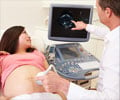According to a new report, a type of ultrasound test may be able to identify patients with a heart condition that is one of the most common causes of sudden death in young people.The condition, hypertrophic cardiomyopathy (HCM), can be caused by more than 100 different mutations in as many as 10 genes. In HCM, the heart muscle thickens, eventually limiting the organ's ability to pump blood and putting patients at risk of heart failure or sudden death from cardiac arrest.
One landmark of HCM is an abnormal enlargement, or hypertrophy, of the left ventricle, the heart's main pumping chamber. But this enlargement doesn't appear in all HCM patients and is often not apparent before a patient reaches adulthood. For this reason, it is hard to identify patients with HCM early in the course of disease. One treatment for the condition involves implanting a defibrillator to restart the heart if it stops suddenly.Researchers have suggested that abnormalities in the heart's diastolic function--meaning how it behaves when it relaxes and fills with blood--may represent an early stage of HCM. Dr. Scott D. Solomon from Women's Hospital in Boston, and colleagues used a type of ultrasound test called Doppler tissue imaging to examine diastolic function in 30 HCM patients and 30 people without the condition. The researchers were able to mark between the healthy individuals and the HCM patients using two measures of the heart's relaxation ability.
Solomon felt that presently, the diagnosis of HCM largely depends on the presence of hypertrophy, which a lot of patients don't develop until later in life. Although the genes involved in HCM have been identified, there isn't a clear genetic test because so many different mutations are involved. Therefore, another way was needed to determine if the disorder is present.
According to Solomon, Doppler tissue imaging "allows us to look at something we haven't really been able to evaluate before--the relaxing ability of the heart. They found that patients with HCM, regardless of whether hypertrophy was present, demonstrated impaired cardiac relaxation.











